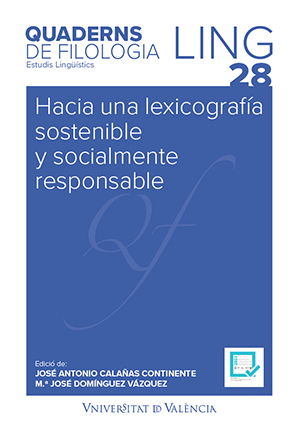Reutilització de l'estructura del diccionari PortLex per crear un contrastiu diccionari de llengües romàniques: una proposta
DOI:
https://doi.org/10.7203/qf.0.26560Paraules clau:
llengües romàniques, base de dades multilingüe, diccionari per a aprenents, preservació de llengües, sostenibilitat Resum
Resum
Aquest article proposa el desenvolupament d’un diccionari en línia multilingüe per a les llengües romàniques, anomenat DiCoRom, utilitzant un enfocament integrador, multilingüe i pedagògic. El diccionari es basaria en l’estructura de base de dades i la interfície d’usuari del projecte lexicogràfic existent PortLex. Es discuteixen els objectius de DiCoRom, els seus usuaris potencials i les adaptacions necessàries a la base de dades i a la interfície. L’article mostra com l’estructura de PortLex pot servir com a base per a un altre projecte lexicogràfic, però destaca la necessitat de redissenyar la interfície per tenir en compte l’orientació pedagògica i social de DiCoRom, així com l’organització de les dades i els exemples per tal de tornar-los més accessibles per als aprenents principiants.
 Descàrregues
Descàrregues
Descàrregues
Publicades
Com citar
-
Resum653
-
PDF 316
Número
Secció
Llicència
 Este obra está bajo una licencia de Creative Commons Reconocimiento-NoComercial-SinObraDerivada 4.0 Internacional.
Este obra está bajo una licencia de Creative Commons Reconocimiento-NoComercial-SinObraDerivada 4.0 Internacional.
Tots els documents inclosos a OJS són d'accés lliure i propietat dels seus autors i/o institucions editores, i per tant, qualsevol acte de reproducció, comercialització, comunicació pública o transformació total o parcial necessita el consentiment exprés i escrit d'aquests.
Authors who publish with this journal agree to the following terms:
- Authors retain copyright and grant the journal right of first publication with the work simultaneously licensed under a Creative Commons Attribution License that allows others to share the work with an acknowledgement of the work's authorship and initial publication in this journal.
- Authors are able to enter into separate, additional contractual arrangements for the non-exclusive distribution of the journal's published version of the work (e.g., post it to an institutional repository or publish it in a book), with an acknowledgement of its initial publication in this journal.
- Authors are permitted and encouraged to post their work online (e.g., in institutional repositories or on their website) prior to and during the submission process, as it can lead to productive exchanges, as well as earlier and greater citation of published work (See The Effect of Open Access).




